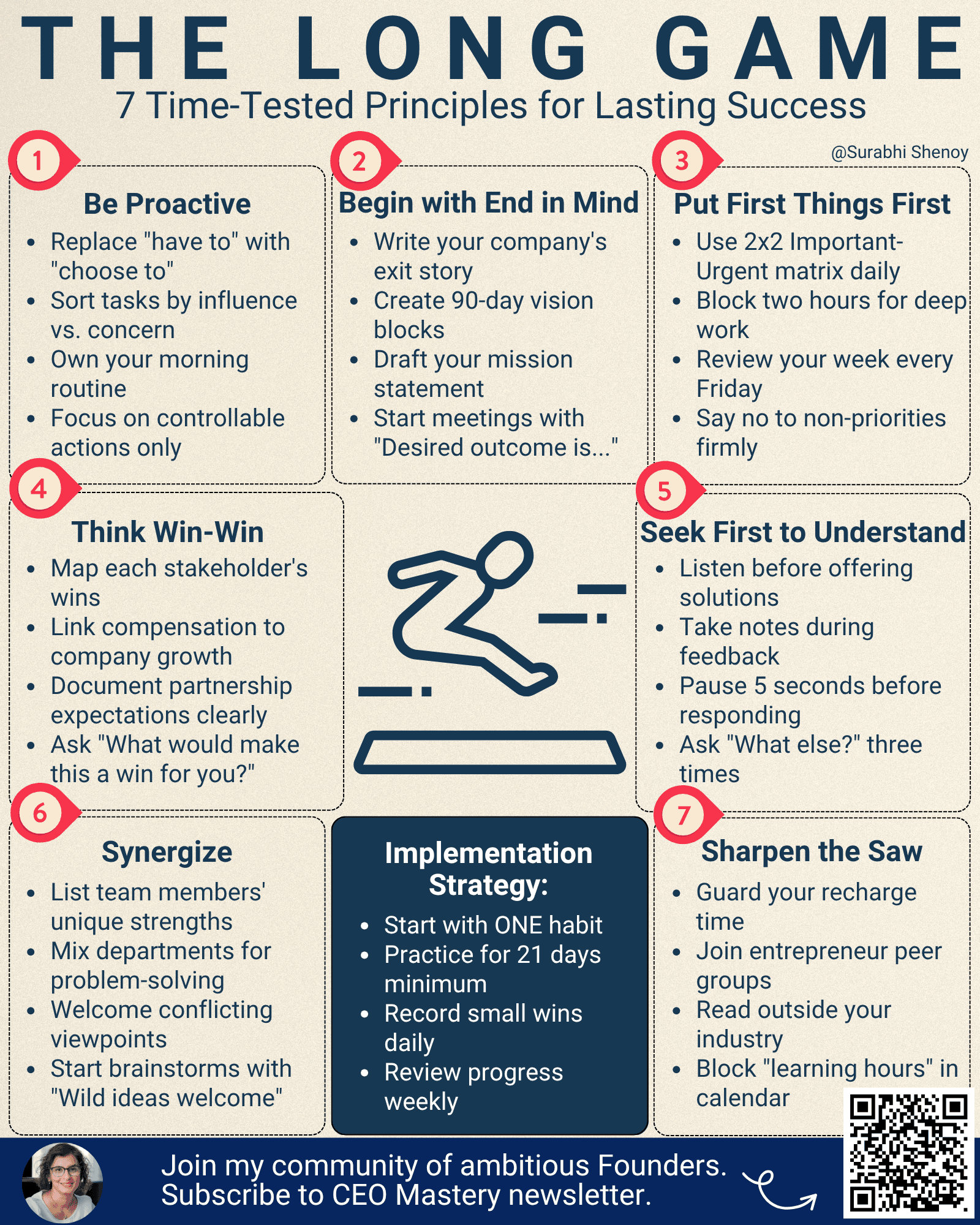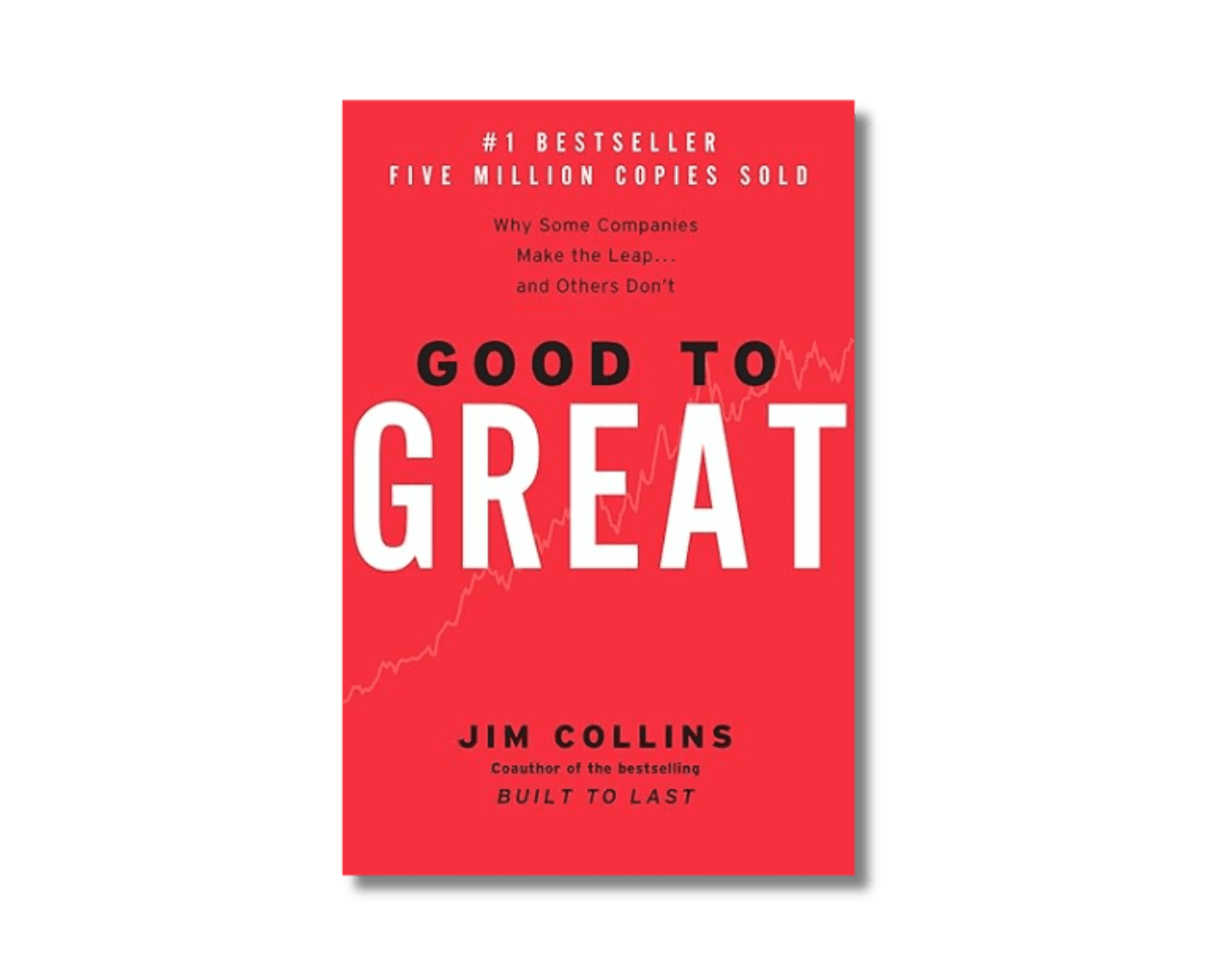The first gift my father-in-law gave me? A book.
Not just any book — The 7 Habits of Highly Effective People.
He’s trained hundreds on it. For free. Long before “side hustle” was even a term.
These principles transformed my tech career. From developer to founder, they worked like magic.
Until they didn’t.
When Principles Seem to Fail
Starting a service business — Elixir Fitness — broke me.
I remember telling him, “This book has ruined me. I need a whip to run Elixir, not principles!”
His response was sagely: “Give it time.”
With no other choice, I did.
And here’s what I learned:
- Principles > force
- Character > tactics
- Systems > shortcuts
Since 1989, this book has guided millions. And that’s no accident.
Because it’s about building you, not just a business. About effectiveness, not productivity. Significance, not success.
The 7 Habits Across My Career Journey
From my own path:
- As a developer: I learned proactivity
- As a PM: I understood Win-Win mentality
- As a founder: I saw why some wins feel hollow
Today, entrepreneurship shouts: “Move fast! Break things! Hustle harder!”
While Covey whispers: “Start with yourself. Build character. Results will follow.”
Turns out, my father-in-law was right.
The principles work — when YOU do.
7 Time-Tested Principles for Business Builders
Let me share how each habit applies specifically to building a lasting business:
1. Be Proactive
This isn’t just about taking initiative. It’s about owning your response to everything.
In practice:
- Replace “have to” with “choose to”
- Sort tasks by influence vs. concern
- Own your morning routine
- Focus on controllable actions only
The shift from reactive to proactive thinking changes everything. When problems hit (and they will), you stop blaming circumstances and start creating solutions.
2. Begin with the End in Mind
Most founders start with product ideas. Great founders start with clear vision.
In practice:
- Write your company’s exit story
- Create 90-day vision blocks
- Draft your mission statement
- Start meetings with “Desired outcome is…”
This habit helped me make better hiring decisions. Each potential team member was evaluated against our end goal, not just immediate needs.
3. Put First Things First
Time management isn’t about doing more things. It’s about doing the right things.
In practice:
- Use 2×2 Important-Urgent matrix daily
- Block two hours for deep work
- Review your week every Friday
- Say no to non-priorities firmly
This habit saved my business during tough times. When cash was tight, I focused only on activities that directly generated revenue or reduced costs.
4. Think Win-Win
Business isn’t zero-sum. The best deals benefit everyone involved.
In practice:
- Map each stakeholder’s wins
- Link compensation to company growth
- Document partnership expectations clearly
- Ask “What would make this a win for you?”
This approach transformed our client relationships. Instead of negotiating against them, we designed pricing models where our success was tied directly to their results.
5. Seek First to Understand
Most business communication fails because we’re too busy thinking about what we’ll say next.
In practice:
- Listen before offering solutions
- Take notes during feedback
- Pause 5 seconds before responding
- Ask “What else?” three times
This habit completely changed how we handled customer complaints. By truly understanding their frustrations first, we could solve root problems, not just symptoms.
6. Synergize
The whole can be greater than the sum of its parts — but only with real teamwork.
In practice:
- List team members’ unique strengths
- Mix departments for problem-solving
- Welcome conflicting viewpoints
- Start brainstorms with “Wild ideas welcome”
This principle helped us create products that no single person could have conceived. Our best innovations came from unexpected combinations of different perspectives.
7. Sharpen the Saw
Continuous improvement isn’t optional for successful founders.
In practice:
- Guard your recharge time
- Join entrepreneur peer groups
- Read outside your industry
- Block “learning hours” in calendar
This habit prevented burnout during our fastest growth period. By protecting time for renewal, I maintained the energy needed for long-term leadership.

Implementation Strategy
Reading is worthless without action. Here’s how to actually apply these principles:
- Start with ONE habit for 21 days minimum
- Practice for at least 15 minutes daily
- Record small wins in a journal
- Review progress weekly
When I first tried implementing all seven habits at once, I failed.
When I focused on mastering just one at a time, everything changed.
Who Should Read This Book
“The 7 Habits of Highly Effective People” is essential reading for:
- Early-stage founders who want to build companies that last
- Business leaders feeling stuck in reactive mode
- Team managers struggling with work-life balance
- Entrepreneurs whose success feels hollow or unsustainable
- Anyone building something meant to outlast them
The beauty of these principles is that they work across industries, company sizes, and personal backgrounds. They’re not trends or hacks — they’re timeless truths about human effectiveness.
The Real Secret to Lasting Success
Here’s what I’ve learned after applying these principles for years:
The 7 Habits aren’t about success tricks. They’re about becoming the kind of person who naturally achieves lasting results.
When you build character first, tactics become secondary. You make better decisions automatically. Your team trusts you instinctively. Clients stay loyal naturally.
As my father-in-law wisely said: “Give it time.”
In business, everyone wants overnight success. But the real game is played long. And these principles are your best equipment for that journey.
And if you’d like to Explore More Strategic Frameworks From My Bookshelf, you might find these interesting:
Essentialism – A deeper framework for “Put First Things First” that helped me master saying no to non-priorities with confidence
Good to Great – See how “Begin with the End in Mind” scales to building a company that outlasts you


 BONUS: Read To Lead: 30 Books Every Founder Must Read.
BONUS: Read To Lead: 30 Books Every Founder Must Read.

